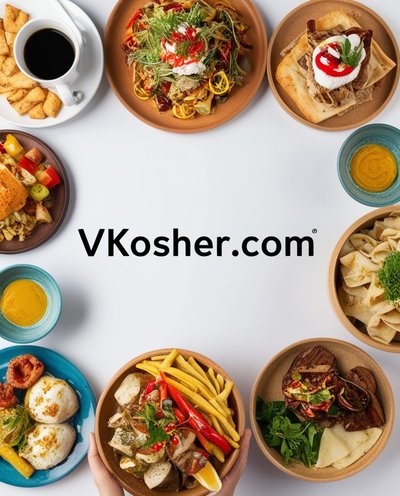Understanding Kosher Food and Its Importance During Sukkot
Kosher food holds a special place in Jewish culture and religious practice, particularly during significant festivals like Sukkot. This eight-day festival, also known as the Feast of Tabernacles, is a time when Jewish families come together to celebrate the harvest, remember the journey of the Israelites through the desert, and give thanks. The laws of Kashrut, which govern what is considered kosher, are closely observed during this time, making the preparation and consumption of kosher food a central part of the Sukkot experience.
The Laws of Kashrut
The concept of kosher food is rooted in the Torah, where the laws of Kashrut are detailed. These laws dictate which foods are permissible for consumption and how they must be prepared. For example, only certain animals are considered kosher, such as those that chew the cud and have cloven hooves, like cows and sheep. Similarly, fish must have fins and scales to be deemed kosher. Birds that are not birds of prey are also kosher, and all kosher animals must be slaughtered in a specific manner known as shechita.
These dietary laws are not only about what can be eaten but also about the separation of meat and dairy. This separation extends to the use of different utensils, cooking methods, and even the times at which these foods can be consumed. During Sukkot, these laws are strictly observed, and the preparation of kosher food becomes an integral part of the holiday's observance.
The Role of Food in Sukkot
Sukkot is a festival that celebrates both the agricultural bounty and the historical experience of the Jewish people. The sukkah, a temporary outdoor structure, is the focal point of the festival, symbolizing the huts that the Israelites lived in during their 40 years in the desert. It is within these sukkahs that meals are traditionally consumed, making the choice of kosher food not just a matter of religious observance but also a way to connect with the historical and spiritual aspects of the festival.
The foods eaten during Sukkot are often reflective of the harvest season. Many families prepare meals using fresh fruits, vegetables, and grains, which are in abundance at this time of year. However, the selection and preparation of these foods must adhere to the strict guidelines of Kashrut, ensuring that all food consumed during the festival is kosher.
Traditional Kosher Dishes for Sukkot
While the specifics of kosher food may vary depending on regional and cultural differences, some dishes are commonly associated with Sukkot. These dishes not only adhere to the laws of Kashrut but also carry symbolic meanings that resonate with the themes of the festival.
One such dish is the stuffed cabbage roll, which is a favorite among many Jewish families during Sukkot. The cabbage leaves, which represent the sukkah, are stuffed with a mixture of rice and meat or vegetables, symbolizing the bounty of the harvest. Another popular dish is kreplach, a type of dumpling filled with meat or potatoes, often served in soup. These foods are comforting, hearty, and fitting for the celebratory yet reflective nature of Sukkot.
The Significance of the Four Species in Kosher Food
During Sukkot, the four species—etrog (citron), lulav (palm frond), hadas (myrtle), and aravah (willow)—play a significant role in the religious rituals of the festival. These species are not only used in the ceremonial blessings but also inspire some of the food traditions associated with Sukkot.
For instance, the etrog, which is a citrus fruit, is often used in cooking during Sukkot. Some families make etrog jam or candy, which is served as a sweet treat during the festival. The symbolism of the etrog, which represents the heart, is carried into these dishes, adding a layer of meaning to the meals shared in the sukkah.
The Experience of Eating in the Sukkah
One of the unique aspects of Sukkot is the experience of eating meals in the sukkah. This practice is not just a ritual but a deeply spiritual experience that connects participants with their ancestors and with the divine. The sukkah itself is an open structure, often decorated with fruits, vegetables, and other symbols of the harvest. Eating kosher food within this space, under the open sky, is a reminder of the fragility of life and the importance of faith.
The act of sharing meals in the sukkah brings families and communities together, reinforcing bonds and creating memories that are cherished for years to come. The kosher food served during these meals is not just nourishment for the body but also for the soul, as it is prepared and consumed with a sense of reverence and gratitude.
Challenges and Rewards of Preparing Kosher Food for Sukkot
Preparing kosher food for Sukkot can be a rewarding yet challenging task. The need to adhere to the laws of Kashrut while also creating meals that are festive and meaningful requires careful planning and creativity. Many families take this opportunity to pass down traditional recipes, teaching younger generations the importance of kosher food and its connection to Jewish identity.
In some cases, the challenge comes from sourcing kosher ingredients, particularly if one lives in an area where kosher food is not readily available. However, the effort to find and prepare kosher food is often seen as a mitzvah, a commandment that brings spiritual reward. The satisfaction of serving a meal that honors both the festival and the dietary laws is a significant part of the Sukkot experience.
Modern Interpretations of Kosher Food for Sukkot
While traditional dishes continue to be popular, many Jewish families today are also exploring modern interpretations of kosher food for Sukkot. This includes incorporating contemporary culinary trends, such as plant-based dishes or fusion cuisine, while still adhering to the laws of Kashrut.
For example, some families may choose to prepare vegan or vegetarian meals, which can easily be made kosher by following the guidelines for fruits, vegetables, and grains. Others might experiment with international flavors, bringing in influences from cuisines around the world, as long as they comply with kosher laws. These modern approaches to kosher cooking reflect the dynamic nature of Jewish culture, where tradition and innovation often coexist.
The Global Influence of Kosher Food on Sukkot
The observance of Sukkot and the preparation of kosher food are not limited to one region or country. Jewish communities around the world celebrate Sukkot, each bringing their unique culinary traditions to the festival. Whether in Israel, North America, Europe, or other parts of the world, the essence of kosher food during Sukkot remains the same, even as the specific dishes may vary.
In Israel, where Sukkot is a national holiday, the abundance of local produce makes the festival's meals particularly vibrant. Fresh fruits and vegetables, along with traditional dishes like challah and kugel, are staples on the Sukkot table. In the United States, Jewish families may incorporate elements of American cuisine into their Sukkot meals, creating a blend of traditional and local flavors.
The Future of Kosher Food During Sukkot
As the world changes, so too does the way in which kosher food is prepared and consumed during Sukkot. With advancements in food technology, there are now more options than ever for kosher consumers. From kosher-certified processed foods to innovative kosher products that cater to specific dietary needs, the landscape of kosher food is evolving.
One emerging trend is the increased availability of organic and sustainably sourced kosher foods. Many Jewish families are becoming more conscious of the environmental impact of their food choices, and this is reflected in their Sukkot meals. The use of organic produce, ethically raised meat, and sustainable cooking practices is becoming more common, adding another dimension to the observance of Kashrut during Sukkot.
Conclusion
Kosher food is more than just a set of dietary rules; it is a way of life that is deeply intertwined with Jewish culture and religious observance. During Sukkot, the preparation and consumption of kosher food take on special significance, as they connect individuals with their heritage, their faith, and their community. Whether through traditional dishes or modern interpretations, kosher food during Sukkot is a testament to the enduring values of Jewish life—values that continue to be celebrated and cherished across the world.




